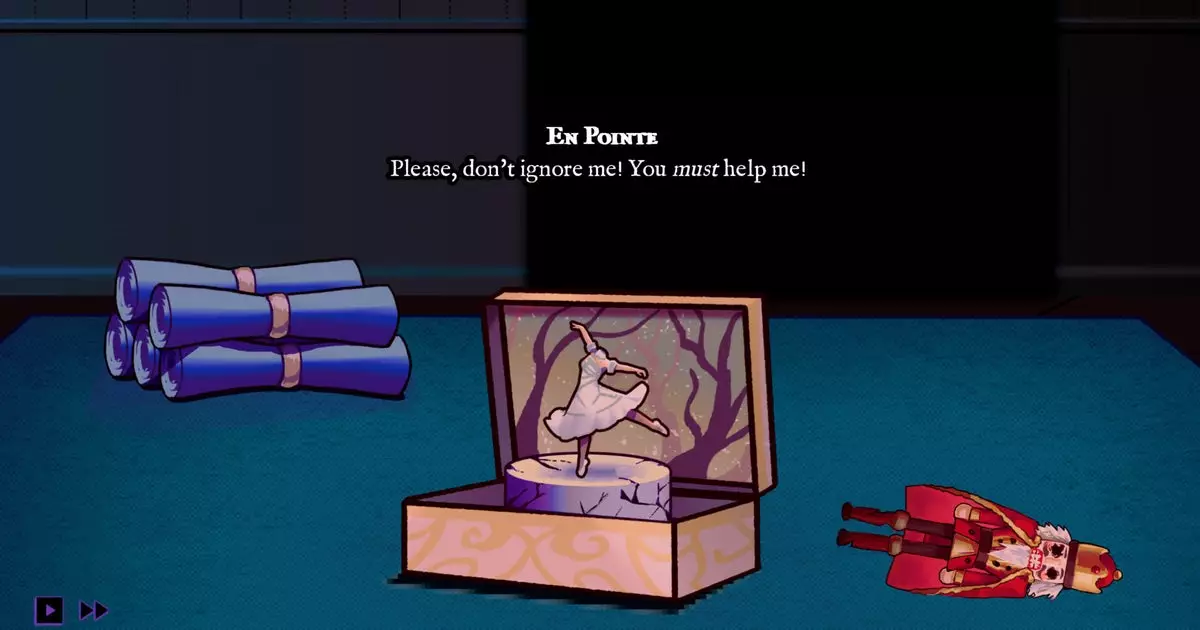At first glance, **Toy Box** beckons players with a seemingly jovial holiday charm, reminiscent of traditional Christmas experiences filled with cheerful toys and joyous festivities. However, a closer inspection, particularly when viewing its trailers, reveals a far more sinister undercurrent. This free visual novel invites participants to embark on a grim journey, submerged in a macabre world where playthings possess a life of their own and dark narratives lurk beneath their pint-sized exteriors.
The Role of the Toy Inspector
In Toy Box, players assume the role of a toy inspector working under the enigmatic Grand Toy Maker. The Maker, whose visage remains hidden, oversees the operation with a cheerful yet unsettling demeanor. The primary objective of the player is to deconstruct toys—five grotesque entities, each brimming with their own harrowing stories. As the narrative unfolds, inspectors are faced with the choice to either “salvage” these animated trinkets or condemn them to the unforgiving flames of an incinerator. The moral dilemma presented is stark: can one discard a miniature talking ballerina, despite her enchanting yet sorrowful tales?
The toys, animated by either imagination or something far more sinister, share their memories and emotions, revealing a narrative dripping with suffering, malice, and a haunting sense of disquiet. Each encounter underscores the essence of despair that these once-beloved toys now embody, raising questions about autonomy, existence, and the relationship between creator and creation.
This visual novel doesn’t shy away from confronting players with its unsettling themes. The presence of content warnings serves as a stark reminder of the psychological depths Toy Box delves into. Where one might expect playful banter akin to festive tales, they instead encounter a spectrum of darker facets—blood, body horror, and the chilling echoes of childhood trauma predominate the dialogue. Even without explicit sexual imagery, the emotional weight is crushing, enveloping the player in a suffocating atmosphere that emphasizes the losses and horrors that can govern existence.
Interestingly, the game succeeds in retaining its dignity despite the grotesque content. The developers, DEADline Studios, steer clear of gratuitous sensationalism. Instead, they weave a narrative that feels grounded and meaningful, juxtaposing the innocent nostalgia of toys against a backdrop of grave themes. Their intent shines through, inviting players to confront the ugly truths that often lurk beneath the surface of harmless childhood memories.
The developers position Toy Box not just as a horror experience but as a vehicle for exploring the human condition. As a small POC and queer-owned studio, DEADline Studios seeks to challenge players to engage with the topics of suffering and resilience. The larger implications of this narrative come across with the subtlety of a well-placed punchline, driving home the stark realities that shape our lives.
While *Fool’s Paradise,* another title from the studio, channels these elements into satirical horror, Toy Box ventures deeper into a psychological journey that borders on surrealism. Here, humor gives way to anguish, and players are left to navigate the murky waters that separate laughter from tears.
The Appeal of Object Deconstruction
Beyond its thematic depth, Toy Box shines through a unique gameplay mechanic: storytelling through the disassembly of objects. This inventive premise captivates, echoing the allure of dismantling and rebuilding—a concept present in several other games. However, Toy Box adds an emotionally charged layer, inviting players to consider the stories behind every layer they peel back.
The comparison arises with titles such as *Hardspace: Shipbreaker*, where players disassemble deserted ships, albeit without the emotional resonance exhibited in Toy Box. It’s this sentimentality, the act of encountering and deconstructing narratives embedded in physical forms, that elevates Toy Box to a status where it stands alone, challenging norms within the visual novel genre.
Toy Box ultimately serves as a profound exploration of darker themes, wrapped in the guise of a colorful visual novel. It transcends the hurdles of horror, tugging at the strings of the emotional and existential dilemmas that surround humanity’s quest for meaning. For those brave enough to explore its depths, Toy Box may serve not just as a source of nightmarish entertainment, but as a reflection on the darkness confronting us all—simply hiding behind the facade of childhood joy.

